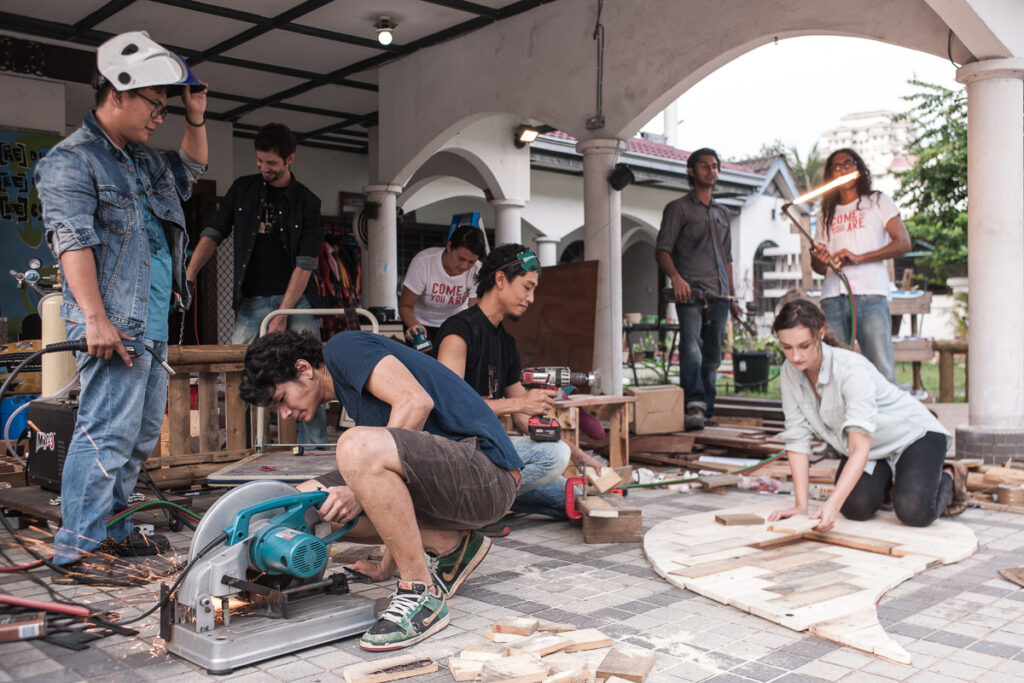
Zhi Yee Teh writes about a Malaysian initiative for plastic recycling to help underprivileged people.
In the national language of Malaysia, “biji” carries the meaning of “seeds”. Biji-biji Initiative is sowing the seeds of sustainability and empowerment.
The discourse on plastic pollution has yet to change. Plastic pollution remains ubiquitous, spanning every nook and cranny of the world—in the atmosphere, our oceans, in animal biomass, and even in our drinking water.
Of the 8.3 billion metric tons of plastic produced, 6.3 billion metric tons have become plastic waste.
However, from that, only 9% has been recycled. The majority (79%) piles up in landfills and the environment, eventually leaking into the oceans.
“Before the Beyond Bins programme, I did not really understand recycling and sustainability. But now, I know where my waste goes and what happens to it. I also collect more recyclables now, and I separate them better.”
Iruthayamary Amaladass (Mary) and Magaispery a/p Pichayare (Magais) are of a lower income, marginalised community, categorised under the B40 income group. This income group represents the bottom 40 percent of the income earners in Malaysia.
Currently, they are both part of a programme called Beyond Bins, established and created by Biji-biji Initiative, a pioneering social impact organization based in Kuala Lumpur, Malaysia.
Beyond Bins aims to achieve a circular economy through a small-scale plastic recycling solution, inspired by the open-source Precious Plastic project. In essence, Biji-biji arranges for plastic recycling machines to be placed at underserved and underprivileged communities and trains them to be adept at creating recycled plastic products. These communities will gain additional income opportunities as Biji-biji connects Beyond Bins to corporates, businesses, and organisations.

Members of the community undergoing Beyond Bins training in November 2020 at Me.reka, Publika (Biji-biji’s headquarters in Kuala Lumpur, Malaysia). From the far right: Mary, Magai and Kokilavani.
A core aspect of the programme is also teaching the communities ways of incorporating sustainability into their daily lives to initiate a positive behaviour change.
“Beyond Bins is a new venture for us as we have yet to be exposed to concepts such as recycling and reusing things,” said Keerthana, the administrator of the Association of Social Services and Community Development of Gombak District, Selangor. “Since Biji-biji’s programme, we have gained awareness about better habits and choices in sustainability – and opportunities in income generation.”
Before exposure to the Beyond Bins programme, Mary and Magais regularly sold recyclables in exchange for cash at recycling centers, making about RM100 (USD $25) for a large bag of recyclables (mostly plastic bottles and aluminum cans) approximately over four weeks of collection.
Following the training provisioned under Beyond Bins, they have expanded their knowledge about recycling.
For instance, they have learned the additional types of plastics to collect and to separate trash at the source. Additionally, training sessions involving the plastic recycling machine exposed them to shredding the recyclable plastic, which often enables it to be sold at a higher price.
As they collected more recyclables, their income increased from RM100 to RM200!
Another notable effect was the shift in the purpose of recycling.
“You’ll see these people in the communities selling recyclables, but it is not done from a sustainability focus,” explained Keerthana.
The small-scale plastic recycling machines were inspired by the Precious Plastic project, an open-source blueprint by Dave Hakkens. The machine, which fits on a table, shreds, melts and molds recyclable plastic to create recycled products, such as plastic coasters, clothespins, keychains, planter pots, and notebooks.
“Biji-biji’s programme has worked well to help the community gain awareness about sustainability and recycling, and now these people have a renewed sense of purpose,” said Keerthana.
Mary and Magais explained how they have been consciously separating their waste since learning more about waste and recycling.
Mary has even gone a step further to influence her husband and children, teaching them about things they can reuse.
Aside from selling the recyclables for cash, Mary and Magais diligently collect specific types of recyclables, such as plastic bottle caps. These are for the production of recycled plastic products to be resold, as part of the programme.
“When will we start receiving orders?” asked Mary, with Magais echoing the question. “We’re ready to make recycled plastic products.”
Beyond Bins: It’s about the people and the planet
Beyond Bins began a community upcycling project six years ago. It is now a full-fledged programme involving several successful partnerships with communities across different regions in Malaysia.
Through the model of Beyond Bins, Biji-biji transforms the value of waste with small-scale plastic recycling solutions. At the same time, the programme introduces the engaged communities to alternative sources of income to support themselves via the production and re-selling of 100 per cent recycled products.
“I can generate my own income without depending on other people,” said Mary.
“There’s an additional income source now, and I like making the plastic products!” Magais added.
The small-scale plastic recycling machines were inspired by the Precious Plastic project, an open-source blueprint by Dave Hakkens. The machine, which fits on a table, shreds, melts and molds recyclable plastic to create recycled products, such as plastic coasters, clothespins, keychains, planter pots, and notebooks.
Once the machine is placed in the target communities, the programme takes the communities through a period of handholding to use the machines to create recycled products from waste. In conjunction with the training, members of the communities are exposed to leadership, entrepreneurial and sustainability values, maximizing the impact of the programme.
As the enabler of the programme, Biji-biji plays an essential role in amplifying the communities’ voice to the stakeholders, corporates, and organisations passionate about leaving the world a better place through strategic partnership and collaboration.
“We want to empower the people, provide them with the means to improve their livelihoods, and at the same time tackle the plastic waste issue,” says Juliana Adam, the Chief Executive Officer of Biji-biji Initiative.
“By providing the right and accessible solutions to manage plastic waste, this means providing an alternative source of income to the communities. Paired with the right education, we’d be one step closer to winning this fight,” said Juliana.
The roots of Biji-biji Initiative
Biji-biji Initiative is a social enterprise with goals of creating a mindset change and behavioural shift towards sustainable living. As one of the earliest impact organizations in Malaysia, Biji-biji began with visions and dreams of introducing a transformative way of viewing sustainability to the local community.
The organization began in 2013 with four friends who are passionate about change-making and sustainability.
As time evolved, so did Biji-biji.
What started in a humble apartment in Jalan Ipoh, Kuala Lumpur grew rapidly with relentless grit, persistence, and the strength of passionate young volunteers had eventually grown into a team of permanent staff and enthusiastic interns from diverse nationalities and backgrounds.
Today, Biji-biji stands together with two sister companies: Biji Biji Ethical Fashion, Biji-biji’s ethical fashion label specializing in seat belt-made pouches and accessories, and Me.reka, an alternative education space emphasizing on upskilling youths and underserved communities for the future of work.
Since 2018, the expanded organisation has officially created a home base in Publika, Malaysia’s hub for artistic and creative minds in the heart of the capital.
In the national language of Malaysia, ‘biji’ carries the meaning of ‘seeds’. For the longest time, Biji-biji has poised themselves as trailblazers of a sustainability movement targeted at changing how the public traditionally views waste. Biji-biji sowed the seeds of sustainability, the circular economy and social entrepreneurship.
Standing at the centre of it all is Beyond Bins, Biji-biji’s trademark campaign championing waste and community sustainability.
Hope and recovery in a global pandemic
In 2021, Biji-biji’s journey with Beyond Bins continues to grow in a new year of recovery and hope.
Operating as normal under the current COVID-19 pandemic has been challenging as many Beyond Bins-related training sessions are usually conducted in a physical setting.
“Currently, due to rising cases and concern over the COVID-19 cases we can’t allow a large number of people coming into the community centre right now, but we will work something out,” said Ms Keerthana.
“We can’t blame the pandemic all the time. We are thinking about ways we can still get things done.”
Biji-biji continues to be inspired by the strength and grit of these communities.
Sustainability is an attainable goal, but the end is not yet in sight; for that, we must keep going.
About Zhi Yee Teh
 Zhi Yee Teh writes for Biji-biji Initiative while handling communications and marketing efforts on Biji-biji’s platforms. When she’s not at Biji-biji, she loves to read and learn about sustainability, waste management and social impact. Connect with Zhi Yee on LinkedIn here.
Zhi Yee Teh writes for Biji-biji Initiative while handling communications and marketing efforts on Biji-biji’s platforms. When she’s not at Biji-biji, she loves to read and learn about sustainability, waste management and social impact. Connect with Zhi Yee on LinkedIn here.



